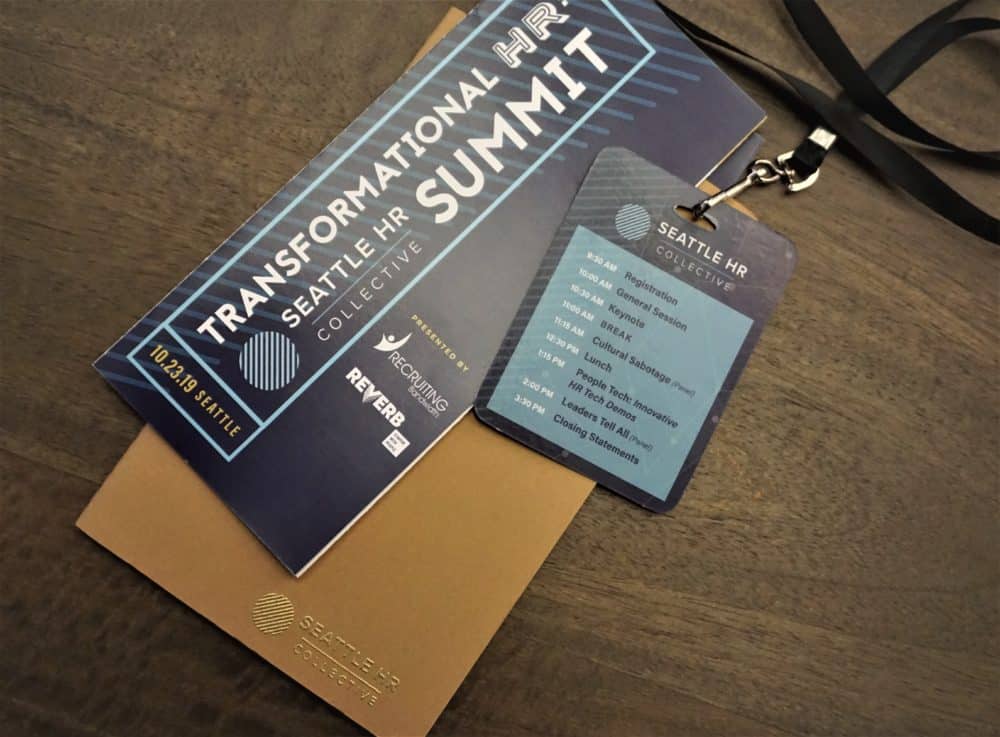Culture is the New Currency
The 23rd of October marked the 2nd Annual Transformational HR Summit, organized by the Seattle HR Collective, a joint venture between Reverb and Recruiting Bandwidth founded in 2016. The goal of the HR Collective is to bring local HR and Talent professionals together to discuss the trends, build community, and spread knowledge that elevates the industry. With more than 1,000 members, we look forward to growing our community of HR professionals even more in 2020.
The 2019 HR Summit packed a lot of professional power into one day, spearheaded by Shannon Anderson, Talent Director at Madrona Venture Group giving the opening keynote. This was followed by two lively panel sessions with other Seattle professionals including Joe Bast from Chewse, Leang Chung from Getty Images, Sharon White from HBO, Mary Miller from Amperity, Xiao Wang from Boundless Immigration, Elizabeth Scutchfield from Refound, and Julie Johns from VICIS.
The Power of Post-it Notes
If it wasn’t immediately apparent from the stage backdrop spelling out, culture is the new currency, the importance of workplace culture was the overarching subject of the day. Shannon’s keynote addressed the rising importance of culture and company identity, as well as the responsibility of a company to define its values and stick to them. But do you create ‘good’ or ‘bad’ culture, and what are some steps to take to implement quality culture from the start? Further than that, how does one go about fixing a toxic culture once it’s already in place?
According to Shannon, “cultural values are the platform for decision making”, and this culture naturally flows from the top. It is value that defines culture and just as you can measure a person based on what they value, you can measure a company based on their adherence to the values they set. In many ways culture is the very lifeblood of every company, but as Shannon and many other professionals have noticed, “it’s hard to operationalize culture”.
So how does a company build culture? It has to be defined on day one. This can take anywhere from a few minutes to an entire day, but a company’s values must be solidified before anything else. Shannon recommend slapping post-it notes of every value you can think of on a board and whittling this down until you’re left with something concise and powerful. If you are already in the situation of a toxic culture and need a whole 180 turnaround, the post-it activity can still steer a company back on course, a retrofit that the company will come to grow into.
A great company culture more than just supports its employees, it inspires them, which might just be the core of its power. If a company defines and aligns with its values from day one and considers culture at every step that follows it will grow stronger and naturally from within. Placing talent with an eye for values is taking a chance on culture, a chance that has and will continue to reap short term, long term, and as yet unforeseen benefits.
As Shannon so succinctly put, “write the story of your own company, don’t let it write you”.
Sometimes You Have to Pierce Reality to Get Results
After Shannon’s illuminating keynote, the Cultural Sabotage Panel took the stage to share both successful and abysmal tales of workplace culture, gracefully navigating around finger-pointing and instead impressed the importance of establishing and following the path set by the company values. There are many types of cultures out there ranging from ‘win at all costs’ all the way to ‘creativity and integrity’, and it’s safe to say that no two companies are the same when it comes to their values.
For Joe Bast, VP of People and Operations at Chewse, “you have to pay attention to culture at every step of the way”. Rote memorization and repetition of cultural values pales in comparison to an entire workforce who truly believes in them.
“You can’t fake culture,” easily declares Sharon White, Sr. VP of HR at HBO, adding, “if you value a relationship-driven culture, you better live up to it… HR leaders are the collected conscious of the company”, but that doesn’t mean they are the only ones to foot the bill for culture–the entire company is responsible for it.
Getty Images Senior Director of HR, Leang Chung shared a story about once working in what she referred to as a culture of debate, one that pitted sectors against each other. When asked about the first step to take to combat a toxic culture, she said, “take a deep breath” because change at this level is a slow process and it is not going to be solved all at once. This in no way means it isn’t worth the effort, more that it’s important to be realistic about the scope and scale of the problem.
According to Mary Miller, Head of People Operations at Amperity, there comes a “pierced reality moment” when it becomes clear for the first time that something just isn’t working. Once reality is pierced in this way, there’s no going back–you can either combat the issue or ignore it, but it will always be there.
A Renaissance of Self-Actualization
Following this was the Leaders Tell All Panel, featuring CEO Xiao Wang of Boundless Immigration, Elizabeth Scutchfield of (Refound), and Julie Johns, Head of HR and Talent Acquisition at VICIS. This panel took the conversation one step further and addressed the smaller-scale but no less important issues faced by companies with a multi-generational and/or distributed workforce.
“Diversity is being invited to the dance, inclusion is being asked to dance, belonging is picking the music.” explained Xiao Wang, CEO of Boundless Immigration. Putting the elements of diversity, inclusion, and belonging together creates a party that few would want to miss.
When it comes to building a culture of belonging Julie from VICIS had one word to say: Empathy. One word with a lot of meaning. Empathy is no easy feat, it requires commitment and courage and, as Julie so neatly put it, you have to “choose to be brave”. Empathy is just as much as choice as courage, and it seems like more and more companies are making choices along those lines.
When asked about a workplace trend they never saw coming, all three panelists had the same thing to say: burnout. Failing to take care of individual needs will most likely lead to burnout in some shape or form, and as mental health and personal needs become safer to discuss (and ultimately value) within a company. Work-life balance is worth more than money, and the culture surrounding mental health in your company will make or break it.
In the end, it pays to pay heed to our own mental and physical health, and as Elizabeth said, “the way we treat ourselves reflects the way we treat other people. Work on yourself as much as you work on your work.”
So What Did We Learn?
A few takeaways from the 2nd Annual Transformational HR Summit:
- Day one culture – a company must build up its culture from day one and evolve along its lines.
- Values define culture – for better or worse. Culture must be considered at every step of the way.
- Culture flows from the top – it must start with leadership.
- Diversity, inclusion, and belonging – apparently it takes three to tango.
- Self-actualization – it’s not about entitlement, it’s about values.
With four times as many people in attendance as the first HR Summit, we are pleased to declare this year a resounding success. The goal of the Summit and the Seattle HR Collective is to foster and build a vibrant community discussion, sharing if not actively creating the “secret sauce” that will elevate our entire industry.
We are looking forward to exploring new trends and issues as we grow, and can’t wait to see you at the next Summit! If interested in panel discussion on a slightly smaller scale than a day-long affair, please check out other events by the Seattle HR Collective and join the community–no, the culture we’re building together.














